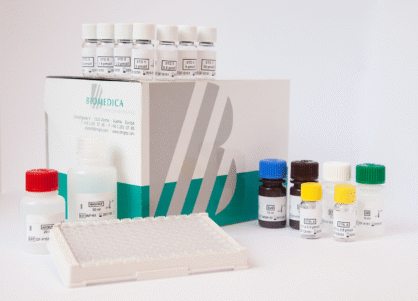FGF23 (C-terminal) ELISA Kit
C-terminal Fibroblast Growth Factor 23 (cFGF23) is a cleavage fragment of the full-length FGF23 protein, which is produced primarily by osteocytes and osteoblasts in bone. FGF23 plays a critical role in phosphate homeostasis and vitamin D metabolism by regulating renal phosphate reabsorption and suppressing 1α-hydroxylase activity in the kidneys. Under normal physiological conditions, FGF23 is secreted as an intact (biologically active) hormone, but it can also be cleaved into N-terminal and C-terminal fragments. The C-terminal FGF23 fragment lacks biological activity but is often present in higher concentrations in circulation, making it a useful analyte for total FGF23 production.
In clinical and research settings, cFGF23 is commonly measured to assess disorders of phosphate metabolism, such as tumor-induced osteomalacia, X-linked hypophosphatemia, and chronic kidney disease (CKD). In CKD, elevated FGF23 (both intact and c-terminal) is linked to disease progression, left ventricular hypertrophy, and increased mortality. C-terminal assays are generally more sensitive than intact assays and can detect both active hormone and fragments, which may be advantageous in early disease detection or when cleavage dynamics are under investigation.
Researchers also use cFGF23 measurements in studies exploring bone-kidney-endocrine axis interactions, mineral metabolism, and the impact of therapeutic interventions (e.g., phosphate binders or anti-FGF23 therapies). Since cleavage of FGF23 reflects underlying post-translational regulation, cFGF23 is a valuable biomarker for understanding FGF23 biology beyond its intact, bioactive form.
This FGF23 (C-terminal) ELISA Kit is manufactured in Austria by Biomedica.



